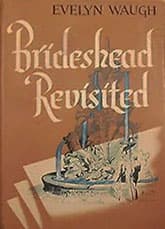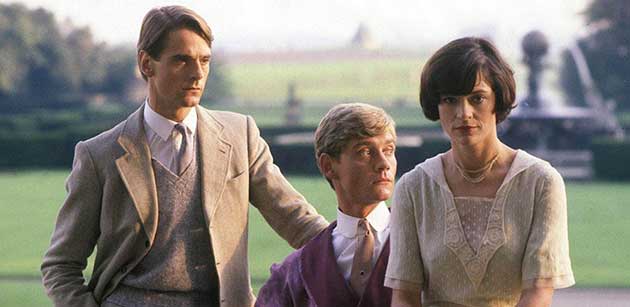Brideshead Revisited
Critique • Quotes • At the movies
 First U. S. edition
First U. S. editionSubtitle
The Sacred & Profane Memories of Captain Charles Ryder
First publication
1945, England
Literature form
Novel
Genres
Literary
Writing language
English
Author's country
England
Length
Approx. 110,000 words

Charles (Jeremy Irons), Sebastian (Anthony Edwards) and Julia (Diana Quick) in the 1981 miniseries.
Visiting hours at Brideshead
Brideshead Revisited (1981): Television miniseries, approx. 11 hours; directors Michael Lindsay-Hogg, Charles Sturridge; writers John Mortimer, Derek Granger; featuring Jeremy Irons, Anthony Edwards, Diana Quick, Simon Jones, Clair Bloom, Laurence Olivier, John Gielgud, Phoebe Nicholls, Charles Keating
A critique of the first adaptation of Brideshead Revisited could be a copy of the critique of the original, so faithfully does the 1981 miniseries follow the novel.
The structure, the plot and the characters are nearly identical with those of Evelyn Waugh's book—without the wholesale cutting, shuffling and inventing that afflicts most adaptations.
The story's themes are also handled as faithfully as possible. This is all the more remarkable as its nostalgia for the pampered, decaying upper classes and its ultimate call for a return to religion would seem out of step with late twentieth-century audiences.
Even stranger is the series taking its cue from the original text for an oblique handling of sexuality. In the 1945 novel Waugh had to pretend the relationship of Charles and Sebastian appeared platonic while hinting at erotic undertones. This was understandable because homosexuality was not really the author's big theme and making it explicit would have overpowered his more serious aims. But by the more enlightened 1980s you might expect implicit gay relationships could be fitted into the story casually without raising a storm.
Unreal or repressed sexuality
Jeremy Irons and Anthony Edwards play the two central male figures winningly in the first half of the eleven-hour production—living it up with a delightfully disreputable crowd at Oxford, enjoying late night escapades in town, and frolicking through the rooms and grounds of Sebastian's massive family home of Brideshead. The pair seem enraptured with each other, sharing joyful and melancholic intimate moments without any overt sign of sexuality. Not a touch nor a kiss.
It sounds unrealistic or repressed at least. But it all works. At least for the first half while the show focuses on the two young men.
Much of the novel's text is used word-for-word for dialogue and for Charles's voice-over. As in the book, the clever writing—credited to John Mortimer (of Rumpole short story fame), but said to have been entirely redone by film and television screenwriter Derek Granger, known for his work on British classics—drives the narrative through the most sumptuously languid scenes.
The assured and leisurely direction hypnotizes one into passing without protest through long scenes and to accept material that otherwise might appear less than credible.
Thirtieth anniversary trailer for 1981 television series Brideshead Revisited.
As the novel does though, this Brideshead Revisited loses some of its steam in the second half as Sebastian is sidelined but Charles keeps coming back to Brideshead to engage with Sebastian's family and take up with his sister Julia (Diana Quick). Then there's the Catholic theme which has been percolating beneath the surface and finally breaks through.
Still, the series engaging enough through to the end. It's helped along tremendously by the stellar acting throughout, apart from the three young leads, including Nickolas Grace who appears intermittently as Charles and Sebastian's stuttering, art-loving and openly gay friend Nicholas Blanche, as well as others in the young crowd. Not to mention the older British theatrical giants Laurence Olivier, John Gielgud and Claire Bloom who anchor the production with small but significant parts.
Small wonder the 1981 Brideshead Revisited won armfuls of awards and is considered one of Britain's greatest-ever television programs.
— Eric

